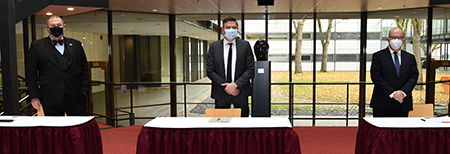You are here:
What does a crisis cost?
40/2020, 26.11.2020
BfR and Helmut Schmidt University conclude a cooperation agreement for interdisciplinary pilot project
Joint press release from the BfR and Helmut Schmidt University
The Federal Institute for Risk Assessment (BfR) and Helmut Schmidt University/University of the Federal Armed Forces Hamburg (HSU/UniBwH) named their scientific research group, which focuses on the "Costs of a crisis - analysis of the significance of non-events in consumer health protection" "Erika (Effective Risk Communication)". The pilot project aims to examine the costs and benefits of avoided crises - so-called "non-events" - in the domain of consumer health protection from an economic and psychological point of view, and will begin in January 2021. The project will also analyse whether and how cost-benefit considerations can be used in communication with different participants in risk communication and reputation management. For this reason, BfR President Professor Dr. Dr. Andreas Hensel and HSU President Professor Dr. Klaus Beckmann signed a cooperation agreement yesterday.

"Risk communication is defined as a continuous and interactive process and characterised by a participatory dialogue with different target groups," says BfR President Professor Dr. Dr. Andreas Hensel. "It can help every person and every interest group to make informed and independent decisions. Our interdisciplinary research group aims to make contributions to the scientific basis of this decision-making problem and, therefore, also increase economic efficiency and transparency," states Hensel, explaining the idea behind the joint project. The research project will primarily deal with the interaction between risk assessment and risk communication in consumer health protection. So-called "non-events" present a particular challenge: these are crisis events that have been avoided and that, due to successful prevention and treatment measures, do not present themselves as such to the individual. Sometimes, preventing a crisis then leads to society questioning the risk and the measures taken - this is also known as a "prevention paradox". The new research group will now analyse the social significance of these non-events in consumer health protection from an economic and psychological point of view and explore the use of cost-benefit considerations to improve risk communication.
HSU President Professor Dr. Klaus Beckmann welcomes the cooperation between the two institutions: "Our first collaboration in socio-scientific research gives our two departments a massive boost in the domain of risk research and once again illustrates the direct application benefit that interdisciplinary explanatory models can have for our society; in this case, the consumer interested in health."
To answer the multifaceted question of how to assess avoided crises, the BfR and HSU rely on a broad range of expertise:
the HSU notably contributes with its economic and psychological competence and the use of its experimental psychological laboratory. The interdisciplinary team at BfR with expertise in psychology and communication science has many years of research experience in the fields of risk communication and crisis prevention.
About the BfR
The German Federal Institute for Risk Assessment (BfR) is a scientifically independent institution within the portfolio of the Federal Ministry of Food and Agriculture (BMEL) in Germany. It advises the German federal government and German federal states ("Laender") on questions of food, chemical and product safety. The BfR conducts its own research on topics that are closely linked to its assessment tasks.
About Helmut Schmidt University
Helmut Schmidt University is a university of the German Federal Armed Forces and a scientific partner of the Federal Government. Like its founder and namesake, it sees science as “a search for knowledge committed to social responsibility”. The university places itself in an international research landscape through competitive basic and applied research. Its structure and rights are organised in accordance with the provisions of Hamburg state law. Research and teaching are unrestricted, and the university manages its own academic affairs.
Media contact
Press office at Helmut Schmidt University, Florian Köfler
Holstenhofweg 85, 22043 Hamburg
Tel. 040 6541-3301
Email: pressestelle@hsu-hh.de
Press office at the German Federal Institute for Risk Assessment, Dr. Suzan Fiack
Risk Communication Department
Max-Dohrn-Str. 8-10, 10589 Berlin
Tel.: +49-(0)30-18412-88000, -88001, -88002, -88003
Email: pressestelle@bfr.bund.de
This text version is a translation of the original German text which is the only legally binding version.
